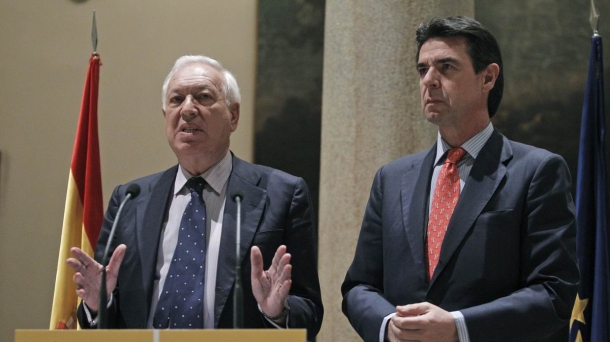news
Expropriation of YPF
Spain threatens Argentina with retaliation over seizure of YPF
Reuters
Madrid
Spain's secretary of state for EU affairs Inigo Mendez de Vigo warned that Argentina would become "an international pariah" if it were to go through with such plans.
-

Spanish ministers José Manuel García Margallo and José Manuel Soria. Photo: EFE
Spain on Friday threatened Argentina with retaliation if it nationalised oil major Repsol's YPF operation, raising the stakes in a long-running row over production at the Argentine unit.
Spain's secretary of state for EU affairs Inigo Mendez de Vigo warned that Argentina would become "an international pariah" if it were to go through with such plans.
"I think that if it happens, it would be very bad news for everybody, but also for Argentina because in the international community we live in, breaking the rules bears a cost," he said.
YPF, Argentina's largest oil and gas company which provides 25 pct of Repsol's operating profits, has been under fierce state pressure to raise production as costly fuel imports eat into Argentina's trade surplus.
A proposal by YPF to boost investment to a record 15 billion pesos ($3.4 billion) was rejected as inadequate by the Argentinean government. "If a (nationalisation) decision were taken it would be very negative for Spanish interests and the duty of this government is to defend Spain's interests with all its might," Deputy Prime Minister Soraya Saenz de Santamaria said after a weekly cabinet meeting. "If the government had to take measures it would, without a doubt," she said.
Speculation has swirled for weeks that the Argentine government could take or buy a stake in YPF or even nationalise it. An expected announcement by President Cristina Fernandez failed to materialise on Thursday.
Spain's foreign minister on Friday summoned Argentina's ambassador to Madrid to seek clarity on the government's intentions on YPF and invite the country to return to the
negotiating table.
Pressure on Argentina
However, other companies and countries have found it difficult to pressure Argentina on similar matters. The South American country has been blocked from issuing international debt since its default a decade ago and has failed to pay compensation awards in disputes involving investors.
In March, U.S. President Barack Obama said he would suspend trade benefits for Argentina because of its non-payment of settlements ordered by a body of the World Bank.
The European Commission said its delegation in Argentina had expressed concerns to the Argentine government over reports of the possible nationalisation. Fernandez nationalised private pension funds and the nation's flagship airline in 2008.
All in the price?
Some media said Fernandez would unveil her plan for YPF on Thursday evening, but she met with the governors of energy-producing provinces privately and made no statement afterwards.
"We analysed in depth the revocation of fields (operated by YPF). Everything is under review, but there is no bill," the governor of Jujuy province, Eduardo Fellner, told Reuters after meeting with the president.
Repsol said in a statement on Friday it had not received any notification from the Argentine government regarding its 57 percent stake in YPF.
While some analysts said even a zero evaluation of YPF was already in Repsol's share price, the uncertainty that lies ahead was still weighing on shares on Friday, which lost over 2 percent to 17.50 euros by 1330 GMT.
YPF's shares are down about 27 percent since Jan. 1, meaning that Repsol may struggle to get a fair price for any stake, despite the recent discovery of shale oil in the Vaca Muerta area that could potentially double YPF's output within a decade.
Receiving cash for expropriated assets may also take years and come in below expectations, as seen by Venezuela's nationalisation payment to Exxon in January.
On the bright side, any money received could be invested in new markets where Repsol has made finds such as Brazil and West Africa.
Repsol, which was previously focused on refining, bought YPF in 1999 for exposure to higher margin upstream oil and gas production, a strategy which failed when Argentine politics led to price controls, putting returns for output well below international levels.
top stories



-
news
New anti-eviction law
Andalucia begins proceedings to seize confiscated houses from banks
-
news
London attack
British police ponder conspiracy after soldier murder
-
Sport
Giro d'Italia
Nibali tightens grip on overall lead after stage victory
© EITB - 2024 - Privacy Policy - Legal disclaimer - Cookie Policy - Cookie settings


